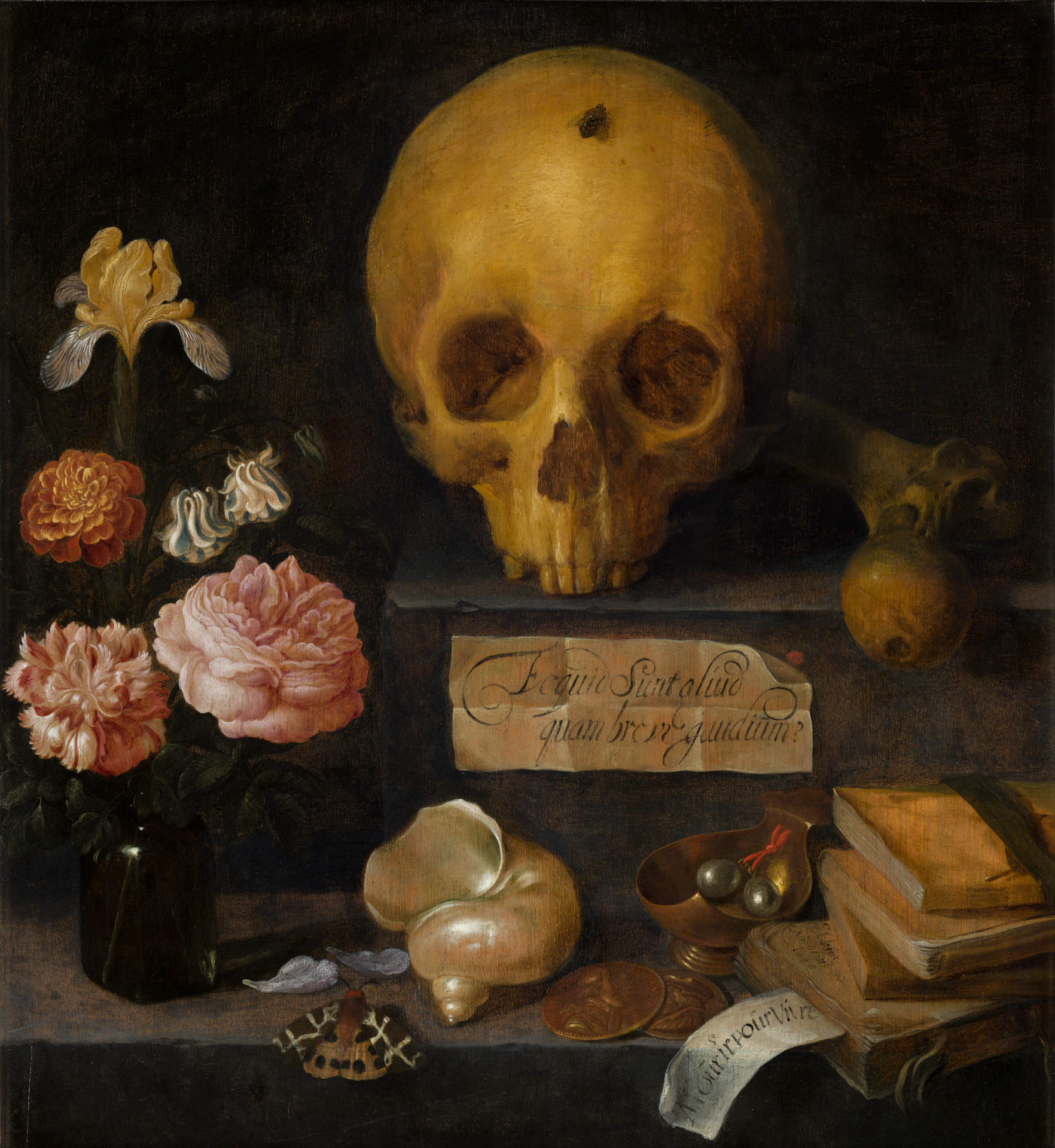
Vanitas Still Life Frans Hals Museum
'Vanitas Still Life with Self-Portrait', Pieter Claesz, 'Vanitas', Edward Collier. Vanitas still life's, which are associated with artists in Northern Europe in the 16th and 17th century, depict objects with symbolic importance, which convey a narrative through their symbolism. These works are meant to highlight the fragility and.
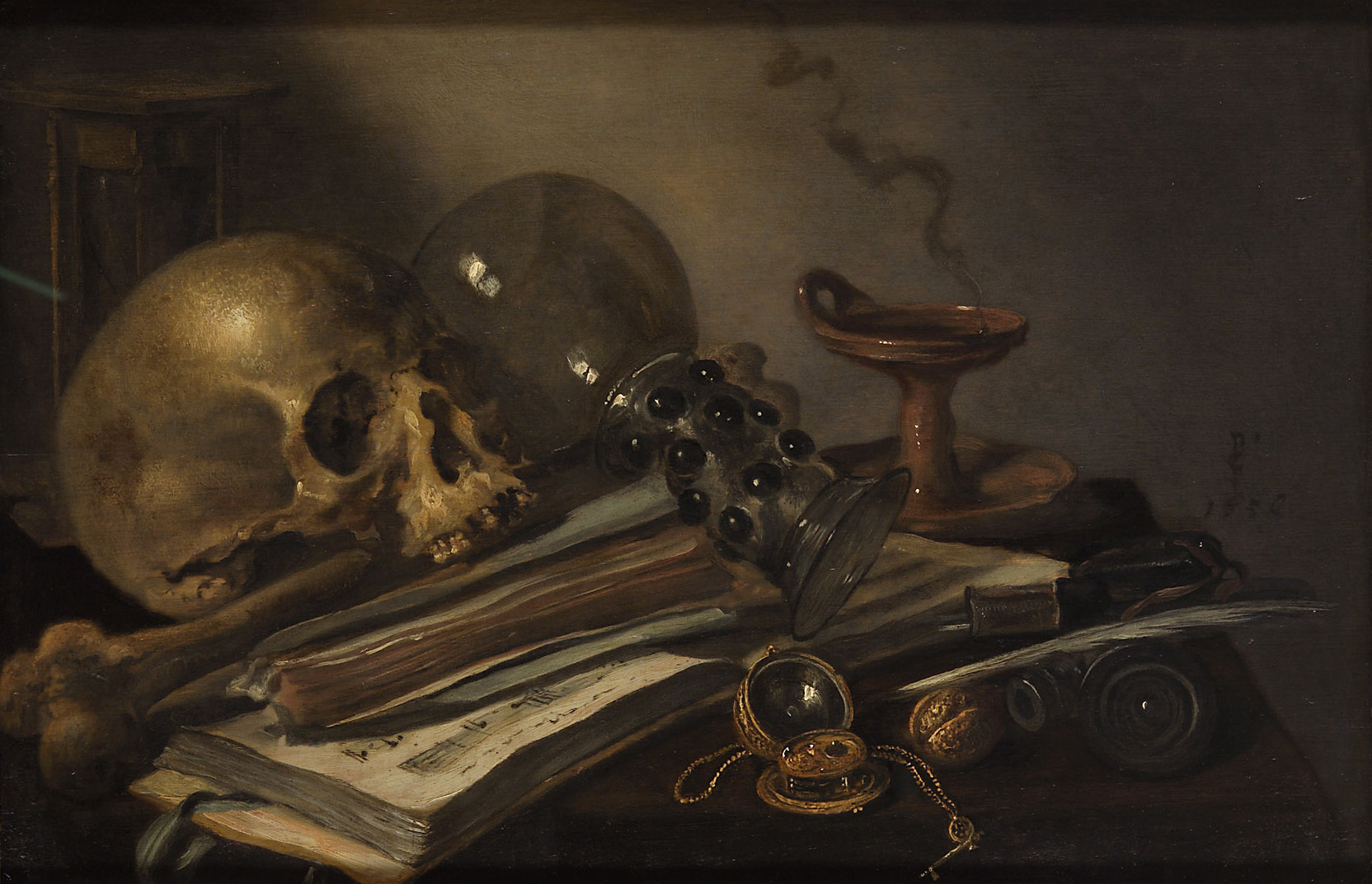
Kunsthistorisches Museum VanitasStillleben
1628 On view at The Met Fifth Avenue in Gallery 520 In this still life, close observation and realistic detail operate in tension with explicit symbolism. The toppled glass, gap-toothed skull, and guttering wick of an oil lamp all serve as stark symbols of life's brevity.

Genial Pieter Claesz Vanitas Stillleben 1625
Pieter Claesz (c. 1597 - 1 January 1660) was a Dutch Golden Age painter of still lifes . Biography Vanitas with the Spinario, 1628, Rijksmuseum, Amsterdam. He was born in Berchem, Belgium, near Antwerp, where he became a member of the Guild of St. Luke in 1620.
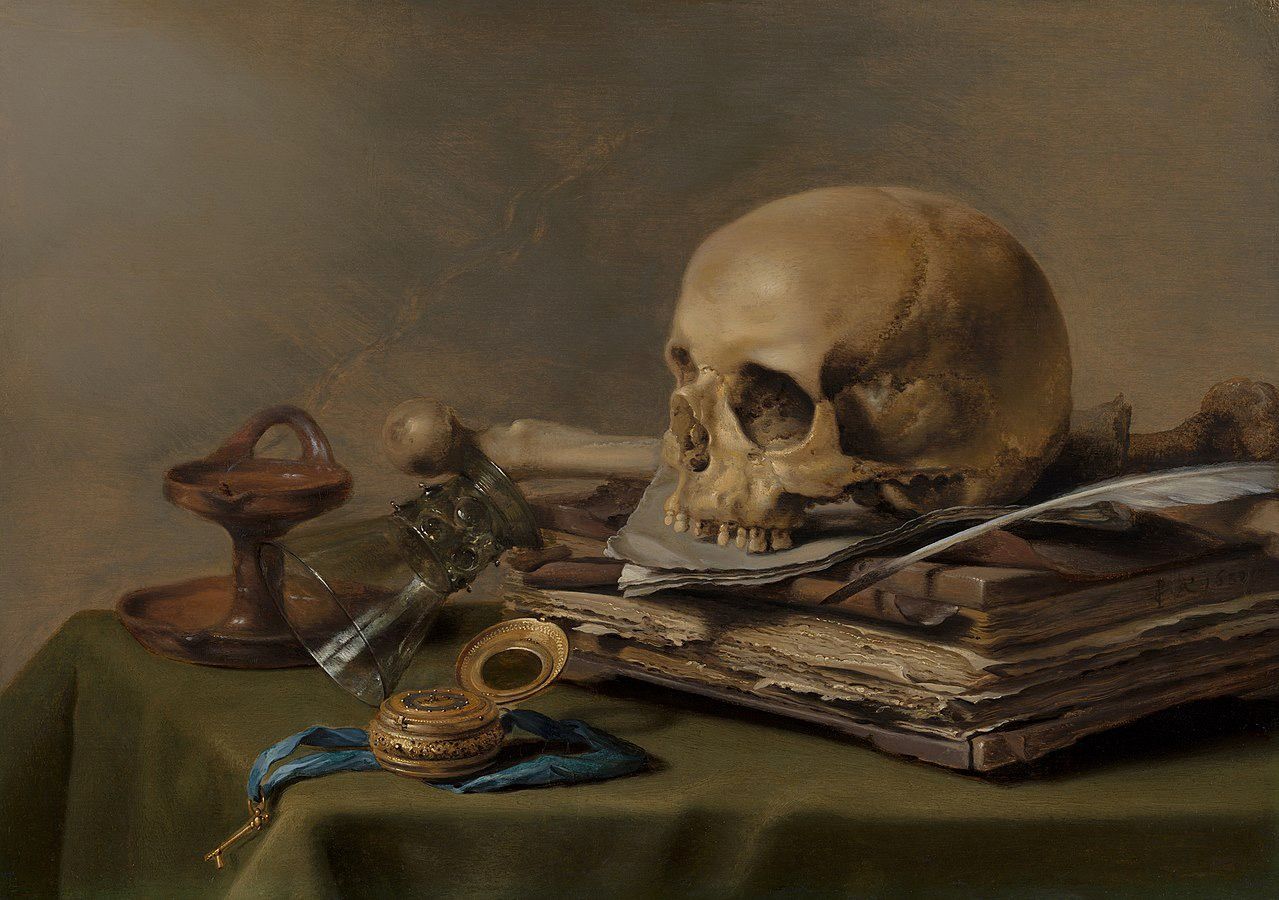
Pieter Claesz, Vanité tableau de et peinture de Claesz
Details Title: Vanitas Still Life Creator: Pieter Claesz Date Created: 1625 Physical Dimensions: Panel, 29,5 × 34,4 cm Type: Painting; still life External Link: See more on the Frans Hals.

N. L. Peschier (Holanda, activo c. 1661). Vanitas still life, 1660. Rijksmuseum. Memento Mori
Pieter Claesz. Pieter Claesz (c. 1597-1 January 1660) was a Dutch Golden Age painter of still lifes . He was born in Berchem, Belgium, near Antwerp, where he became a member of the Guild of St. Luke in 1620. He moved to Haarlem in 1620, where his son, the landscape painter Nicolaes Pieterszoon Berchem was born (October 1).

Pieter Claesz Vanitas Stillleben, c 1630 Öl auf Holz Auss… Flickr
The official position taken by the Wikimedia Foundation is that " faithful reproductions of two-dimensional public domain works of art are public domainThis photographic reproduction is therefore also considered to be in the public domain in the United States.
File1628 Claesz VanitasStillleben mit Selbstbildnis anagoria.JPG Wikimedia Commons
Pieter Claesz was an eminent Dutch still-painter of the 17th century. His range of subjects included simple breakfast settings with glinting glass or metal objects painted in a largely monochromatic palette. Claesz also made several vanitas paintings during his career—allegorical still lifes which included symbols of death or impermanence to.

Musical Vanitas after Pieter Claesz Vanitas, Vanitas paintings, Dutch still life
Vanitas Still-Life. 1630. Oil on canvas, 39,5 x 56 cm. Mauritshuis, The Hague. Nearly all Dutch still-lifes include - to a greater or lesser extent - the aspect of vanitas, a lament about the transience of all things. It is often symbolized by objects such as a skull or a clock, as in this painting, where the effect is enhanced by an overturned.
Pieter Claesz Vanitas Still Life (1630) r/museum
File usage on Commons The following 12 pages use this file: A Modest Message, Volume I illustrations by figure nr. A Modest Message, as Intimated by the Painters of the "Monochrome Banketje" File:1628 Claesz Vanitas-Stillleben mit Selbstbildnis anagoria.JPG File:After Pieter Claeszoon - Vanitas-Still-Life - c. 1634.jpg

Sapori in concerto La Vanitas nella pittura dell'olandese Pieter Claesz
Pieter Claesz (1596/97-1660) Vanitas Still Life, 1630. Oil on panel. 15 ½ x 22 in. (39.5 x 56 cm) Royal Picture Gallery Mauritshuis, The Hague. Acquired in 1960 with the support of the Openbaar Kunstbezit Foundation and the Rembrandt Society. Inv. no. 943. The vanitas image is a reminder of life's brevity and the worthlessness of material.

Frisch Pieter Claesz Vanitas Stillleben Mit Nautiluspokal
Pieter ClaeszVanitas Still Life. 1630 Nicht zu sehen. A snuffed-out candle, an empty glass, a watch and a skull. This is no random collection of objects. Each one conveys a message of mortality. Memento mori - remember you must die. The Haarlem artist Pieter Claesz became well-known for his still-lifes featuring a limited palette.

VanitasStillleben mit Nautiluspokal von Pieter Claesz. Kunstdruck > Bildergipfel.de
Renowned for producing vanitas still lifes at a rapid pace, the imagery in Pieter Claesz's Vanitas Still Life (1630) is saturated with symbolic potency: the golden pocket watch, the empty overturned glass, the skull and the unlit oil lamp allude to death, warning the viewer of the futility and meaninglessness of material goods and possessions.
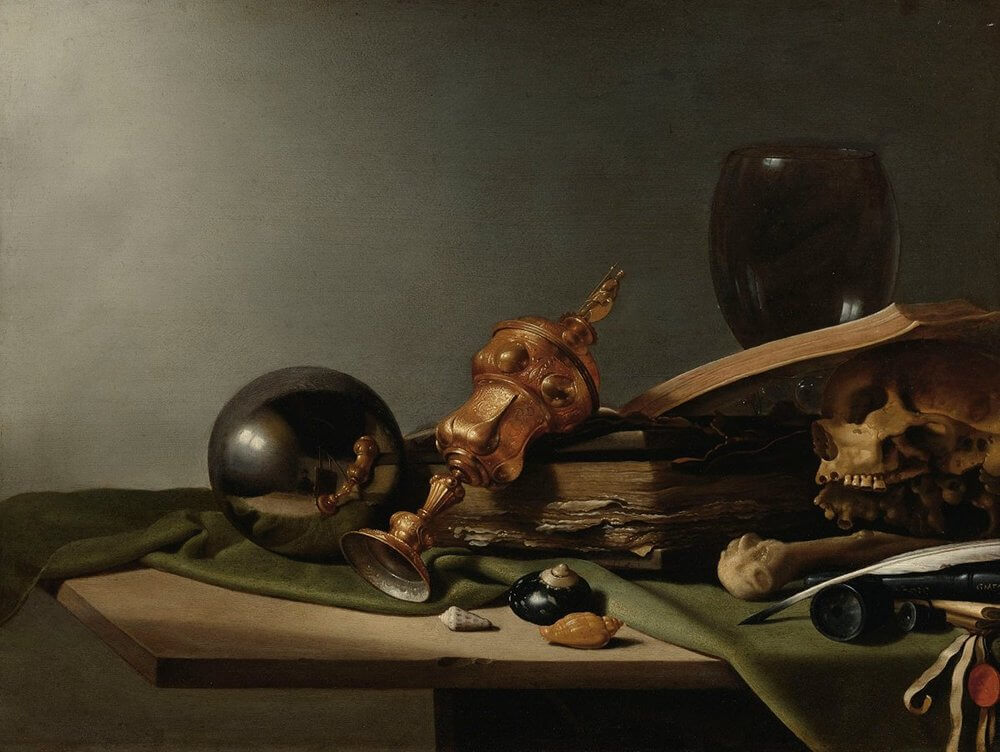
Vanitas StillLife (c. 1634) Perspectives & Possibilities
1634. by Pieter Claesz. A vanitas still life with a silver-gilt cup, shells, books, a quill, an inkwell, a skull, a sphere and a roemer, all on a wooden table draped with a green cloth. [ source ]

Genial Pieter Claesz Vanitas Stillleben 1625
Pieter Claesz Vanitas Still Life. 1630 Not on view. A snuffed-out candle, an empty glass, a watch and a skull. This is no random collection of objects. Each one conveys a message of mortality. Memento mori - remember you must die. The Haarlem artist Pieter Claesz became well-known for his still-lifes featuring a limited palette..
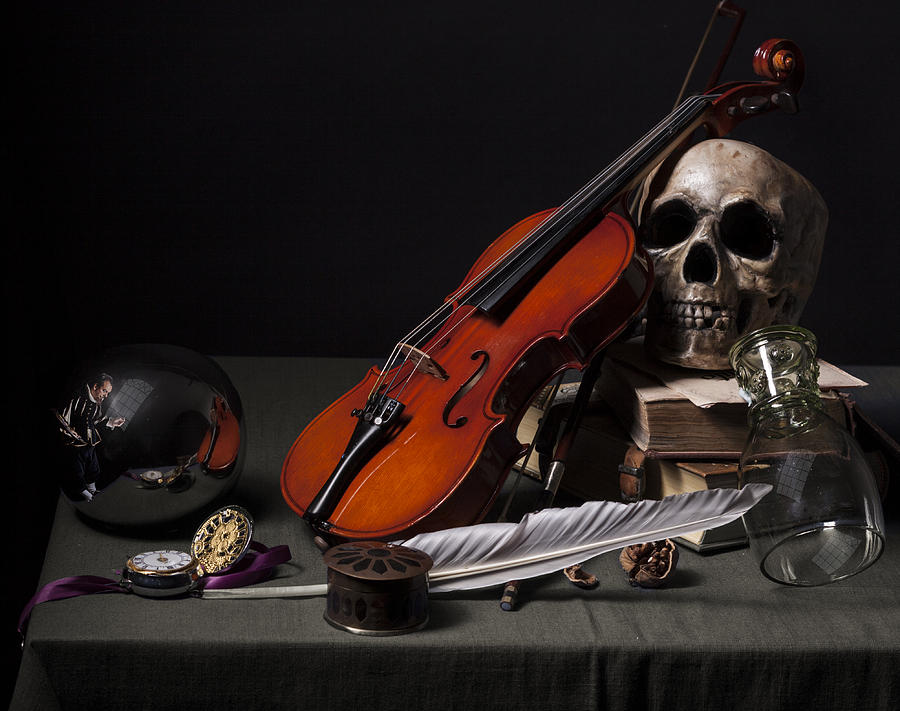
Pieter Claesz Vanitas Still Life With Violin And Glass Ball 1628 Photograph by Levin Rodriguez
Vanitas Still Life Vanitas Still Life By Pieter Claesz. Request. High resolution Please fill in the required fields as completely as possible: Number. First name *. Pieter Claesz. A table with a candle, burning, a watch, an anemone,a skull and a letter with the words Haarlem and Georg. The objects were carefully chosen for what they stood.

Still Life with Herring, Wine and Bread Pieter Claesz 1647 Painting still life, Dutch still
Vanitas Still Life with the Spinario, Pieter Claesz, 1628 Show details 1,292 Vanitas Still Life with the Spinario, Pieter Claesz, 1628 oil on panel, h 70.5cm × w 80.5cm Catalogue entry Appearances can be deceptive - certainly in painting, which gives only an impression of reality.